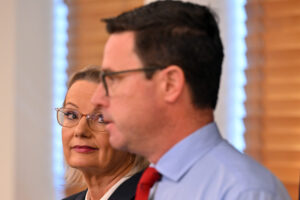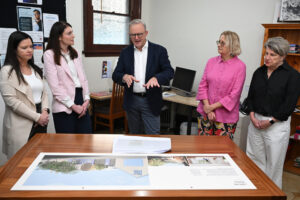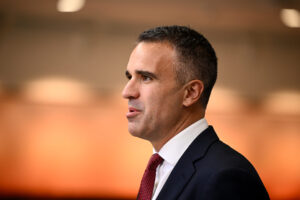The election exposed weaknesses in Australian democracy – but the next parliament can fix them
Australia has some very strong democratic institutions – like an independent electoral commission, Saturday voting, full preferential voting and compulsory voting. These ensure that elections are free from corruption; that electorate boundaries are not based on partisan bias; and that most Australians turn out to vote. They are evidence of Australia’s proud history as an electoral innovator.
However, there were some sour notes in the election campaign. Voters reported being confused and alarmed by political parties inserting themselves into the postal vote process. Political parties passed confidential data to other groups, without informing voters. And most voters reported seeing misleading advertising on a daily basis.
Australians deserve better. Here are six weaknesses that emerged during the federal election and how they could be addressed.
Lies in political ads
Australia Institute polling research conducted in the last week of the federal election campaign found most Australians saw misleading ads weekly, or more frequently.
That’s backed up by the warring claims of misinformation that played out in the media. Both major parties were accused of selective editing of videos to mislead audiences. Trumpet of Patriots, backed by mining billionaire Clive Palmer, spent “at least $175,000 promoting a misleading two-decade-old video”.
Campaigners worked around the already very limited federal misinformation laws. Right-wing campaigners Advance timed their circulation of a flyer “to avoid a ban on misleading campaign material once the poll has been called”.
Parts of Australia have effective truth in political advertising laws. They have existed in South Australia for 40 years, and the ACT adopted them five years ago. They ensure that misleading and inaccurate political advertising is stopped. They strike a careful balance between protecting opinion and preventing lies. They are respected by both sides of politics.
And the Albanese Government has a bill that would implement these laws at the federal level: the Electoral Communications Bill. It innovates on the South Australian model in a couple of ways, including addressing Artificial Intelligence deepfakes and placing responsibility for decision-making with a trusted former judge.
Unfortunately, the Government neglected the bill last year. Will the Government fix the problem this term?
Political parties inserting themselves in the postal vote process
The major political parties ran postal vote campaigns, where they bundle the application form for a postal vote with party advertising material. The form goes back to the party, who are suspected of harvesting the data, before passing the form on to the Australian Electoral Commission (AEC).
The AEC has criticised the practice, saying it is the number one source of complaints during election campaigns.
In the last term of Parliament, a multi-party committee recommended stopping this practice by:
- banning postal vote forms from being bundled with other material and
- requiring that forms go straight to the AEC, not routed through a political party’s headquarters.
Text message spam and sharing of personal information
Political parties, members of Parliament and (in some cases) candidates get special exemptions to the Spam Act (which restricts unsolicited communications) and the Privacy Act (which restricts the sharing and use of personal information). Parties and candidates also get exclusive access to the electoral roll. The roll has the names, dates of birth, addresses and some other details of almost every adult citizen living in the country.
It is these exemptions and special access that allowed the Liberal Party to share its cache of voter information with the Exclusive Brethren, a secretive religious sect that reportedly “made nearly a million [phone] calls on behalf of the [Liberal–National] Coalition”.
Similarly, it is Spam Act exemptions that allowed the Trumpet of Patriots to send vast numbers of unsolicited text messages promoting the party and its candidates. Text message spam is not unique to one party; both the Liberal Party and Labor Party have in past elections sent out last minute election text messages, when it is too late for them to be fact checked and challenged.
Independent MP Kate Chaney has proposed amending the acts to remove certain exemptions that political parties enjoy – including sending unsolicited text messages. In 2022, the Attorney-General’s Department proposed more limited exemptions.
Territorians miss out on Senate representation
Australia’s smallest state, Tasmania, is represented by 12 senators. The combined population of the ACT and Northern Territory far exceeds Tasmania’s, but the territories only have 4 senators between them.
The number of parliamentarians has not increased since the 1980s, meanwhile the country’s population has increased by over 10 million people. That leaves MPs spread thinly, and makes it hard for communities to hold their local members accountable.
While a large increase in the number of parliamentarians is due, it would be fair if at the very least the territories had more senators.
Unfair playing field for independent candidates and minor parties
Australia’s election laws are skewed towards political parties, and towards major parties in particular.
As well as exemptions to spam and privacy laws already discussed, political parties receive tax-deductibility status year-round, while independent candidates’ tax exemptions are limited to the election period only. In Senate contests, political parties receive a privileged position on the ballot – making it nigh impossible for an independent to win.
Established political parties also receive tens of millions of dollars in taxpayer funding, as do some independent candidates – but only after the election is over. New entrants have to self-fund their campaigns or raise money through donations, while major party competitors have a taxpayer-funded head start.
Unfortunately, the deal between Labor and Liberal parties at the start of the year to change electoral laws has only worsened the situation.
The Australia Institute outlines how to make political finance fairer in our Democracy Agenda for the 48th Parliament.
Australians confused about how the electoral system works
Many Australians are unclear on how Australia’s voting system works. Even election officials are known to get it wrong.
While civics education is important during schooling, the government and AEC should do more to teach adults about the Australian voting system as well. One element of this could be to boast of Australia’s history as a democratic innovator. Another might be to use the ABC’s wide public electoral reach (evident in its Vote Compass tool) to help voters familiarise themselves with the voting process ahead of election day.
At this year’s election, there seemed to be an uptick in disputes and physical contention – not necessarily among candidates, but with volunteers and canvassers, particularly at pre-polling. While there is no substitute for a healthy democratic culture and mutual respect, addressing some of the weaknesses in Australian democracy may take some of the heat out of campaigning.
Australia’s history as a proud electoral innovator means the country is well placed to improve its institutions and processes.
Related research
Between the Lines Newsletter
The biggest stories and the best analysis from the team at the Australia Institute, delivered to your inbox every fortnight.
You might also like
Gender parity closer after federal election but “sufficiently assertive” Liberal women are still outnumbered two to one
Now that the dust has settled on the 2025 federal election, what does it mean for the representation of women in Australian parliaments? In short, there has been a significant improvement at the national level. When we last wrote on this topic, the Australian Senate was majority female but only 40% of House of Representatives
Election entrée: think three-year terms are too short? Spare a thought for generations past.
Complaints about the brevity of three-year parliamentary terms are common in Australia.
South Australia’s leap into the unknown with political finance changes
July 1 marked a dramatic change in how political parties and candidates are funded in South Australia.


